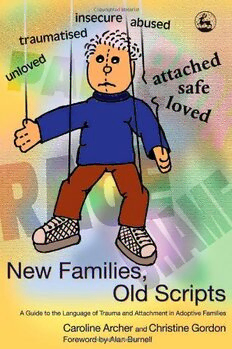
New Families, Old Scripts: A Guide to the Language of Trauma And Attachment in Adoptive Families PDF
254 Pages·2006·1.163 MB·
Most books are stored in the elastic cloud where traffic is expensive. For this reason, we have a limit on daily download.
Preview New Families, Old Scripts: A Guide to the Language of Trauma And Attachment in Adoptive Families
Description:
Most adopted children and their families will, sooner or later, encounter the challenges of dealing with unresolved attachment issues or early traumatic experiences. "New Families, Old Scripts" is an accessible introduction to understanding these challenges and helping children and their families to develop a shared language and understanding of one another. Steeped in the experience of the authors, the book offers a wealth of practical guidance and intervention in a no-nonsense style that will be readily understandable to both families and the professionals who work with them. Case examples bring the issues to life, while sample letters addressed to the parent offer sensitive, jargon-free advice on the issues they are likely to encounter - whether it be dealing with anger and aggression, understanding sibling issues or how to react to sexualised behaviour. The authors also explain some of the theoretical background to trauma to encourage a better understanding of the relationship between trauma, attachment and development. The accessible combination of theoretical approaches and practical advice makes "New Families, Old Scripts" an ideal resource for social workers and adoptive or foster parents. Family Futures Consortium provides services for parents and professionals working with adopted and fostered children, including training and consultation for statutory and voluntary agencies nationwide. In their therapeutic work with families, they have evolved a unique intensive, multi-disciplinary approach to supporting children with attachment and trauma-related difficulties.
See more
The list of books you might like
Most books are stored in the elastic cloud where traffic is expensive. For this reason, we have a limit on daily download.
